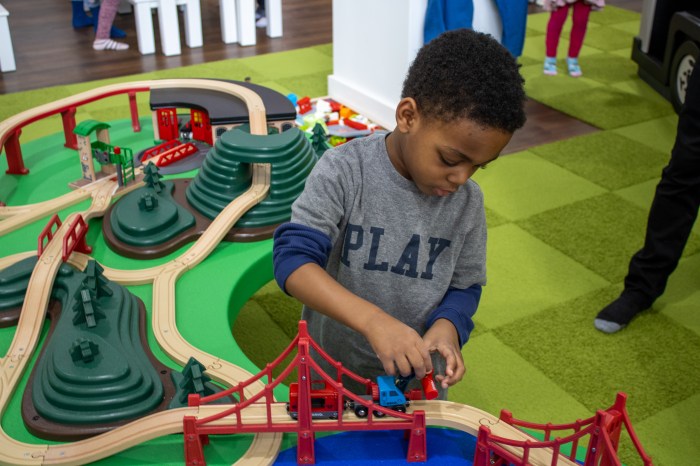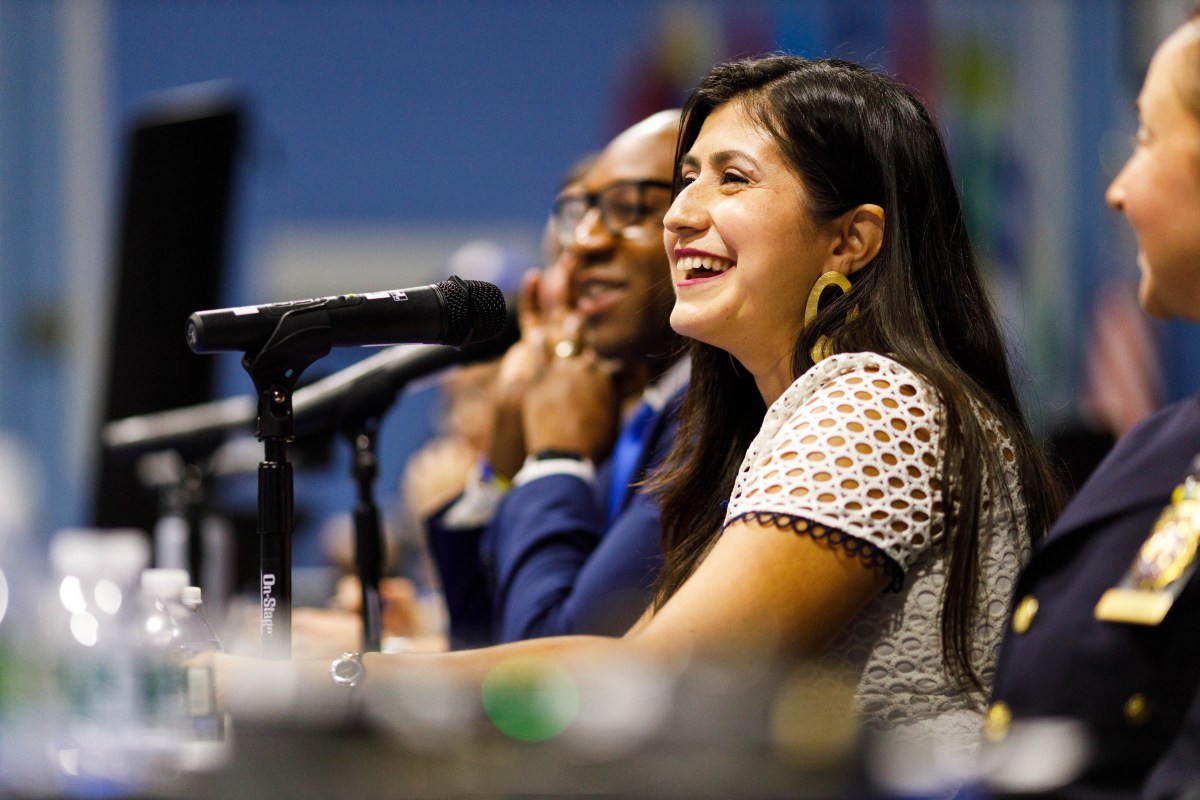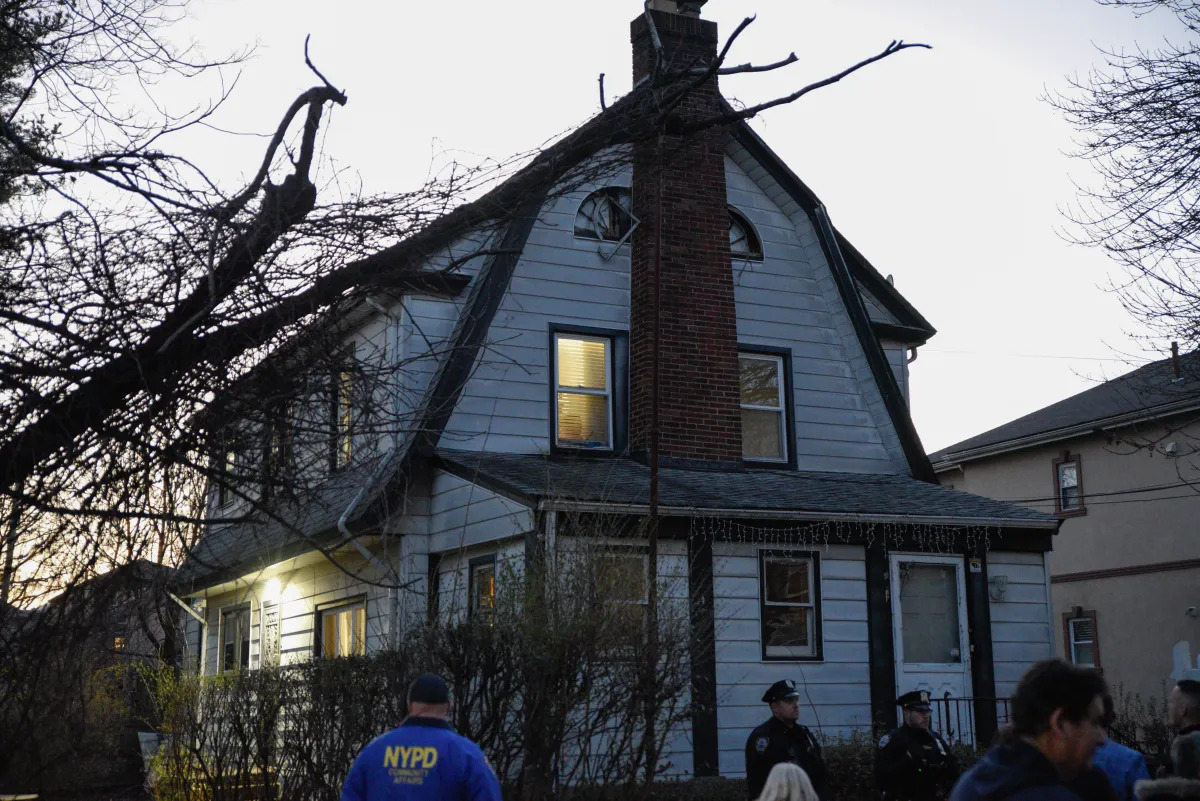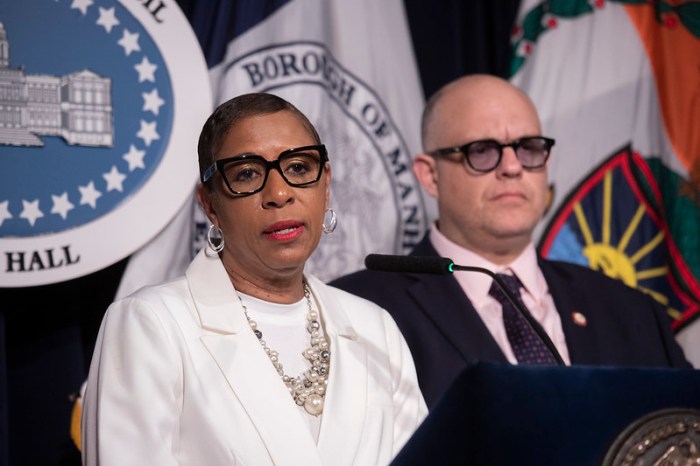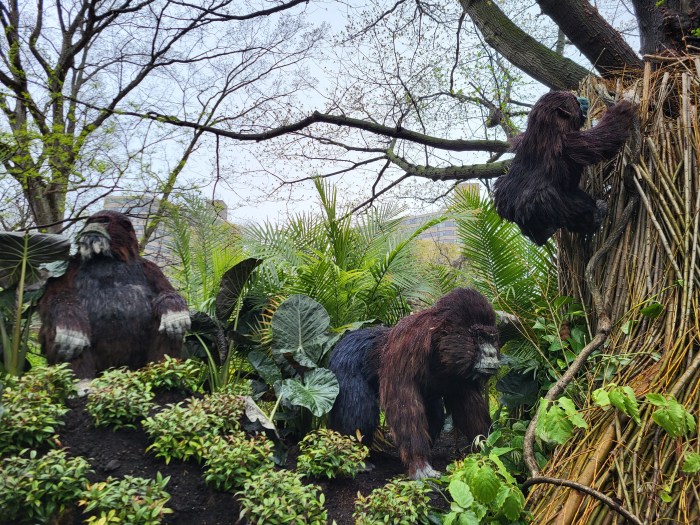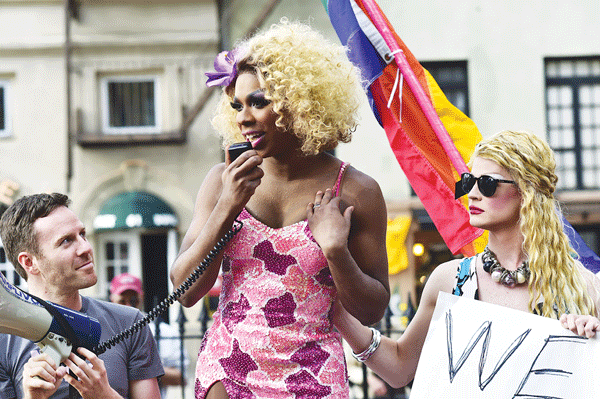
BY JORDAN MUTO | On Sunday, drag queens gathered for a rally at Christopher Park to protest what they say were discriminatory remarks from the West Village’s block associations.
The rally was organized as a response to last week’s Community Board 2’s State Liquor Authority Licensing Committee meeting, at which popular Christopher St. bar Boots N Saddle, known for its nightly drag queen shows, proposed to move to the old Soy and Sake space on the corner of Seventh Ave. South and Morton St.
At the meeting, members of some of the community groups criticized the drag queens, voicing concerns about noise, crowds and residents’ children seeing such performers.
“I feel bad,” said Elaine Goldman, president of the Christopher St. Merchants and Block Association. “Everyone feels bad. No one wants anyone to lose their jobs. It is very factual. It is very sad. People just want to sleep.”
Goldman emphasized that people wanting a quiet place to come home and sleep was at the heart of the issue.
“It is about past behavior forecasting future behavior,” she explained. “They are being judged about past behavior.”
The bar has a reputation in the neighborhood for being loud and always having a crowd, whether inside the bar or outside on the street smoking, explained Greg Jackson, of the Morton St. Block Association. He said he visited Boots N Saddle about a month ago to check out conditions there.
The rally was organized by Frostie Flakes, one of Boots N Saddle’s drag queens, as well as an L.G.B.T. activist.
“It was an outrage,” Flakes said of last week’s meeting.
Added Robert Ziegler, co-owner of Boots N Saddle, “They can talk about me and the bar, but it upsets me when they go after my employees, customers and entertainers. We will keep fighting.”
About 50 people attended the “We Were Here First” rally, whose name referred to the idea that the Village was a place for the L.G.B.T. community before the middle- and upper-class families that now inhabit the area.
“I hope that our voice is heard and that the message is received that this is our home,” Flakes said before the rally’s start. “We are not opposed to sharing, but don’t kick us out.”
“I definitely want to bring light to the issues that stem from homophobia and bigotry,” said Brenda Dharling, a drag queen who works at Boots N Saddle, describing her goals for the rally. “We are not going anywhere. We are not big monsters. We really love the neighborhood. I hope they become more embracive.”
Drag queens, community leaders and activists were among the speakers at the rally, which began at 4:30 pm.
“Drag queens are full of life, love and color,” said Flakes in her introductory speech.
She talked about the concerns that some neighborhood families say they have over the drag queens’ presence in the community.
“We are teaching them it is not O.K. to be who they are,” Flakes said of drag queens and the lesson children will learn about them if the former are pushed out.
Bob the Drag Queen emphasized the Village’s safe haven aspect.
“They don’t understand what it is like to be aware of your gayness every second of every day,” she said.
“This is our home, man,” said Tod Tif Fernandez, who lived on Morton St. for five years in the early 2000s. “This is our home. New York is still not a safe haven.”
Siobhan Weiss, who has lived in the neighborhood for 27 years, angrily blasted the critics at last week’s C.B. 2 meeting.
“Why did you move to Greenwich Village, moron?” she scolded. “There are other neighborhoods that you can peddle your brand of entitlement.”
Teens and young adults need a place like Boots N Saddle, Weiss explained, because it’s somewhere for them to go and be accepted, when they might not otherwise find that same sense of acceptance of who they are in their own community.
“I heard what happened and it pissed me off,” Weiss said of why she attended the rally. “I walk by there almost every day when walking my dog, and never had a problem other than the occasional snarky comment about my fashion sense.”
“Boots N Saddle is one of the best businesses we have. The owner is loyal and fierce,” declared Jessica Berk, founder of the Christopher St. Partnership.
Yet, for some drag queens, deciding to attend the rally was not a clearcut choice.
“What if it causes more commotion than it really is?” asked Yuhua Hamasaki, who performed at Boots N Saddle the night before the rally. On Saturday night, Hamasaki was still undecided if she would attend.
At the rally, there were only three drag queens dressed in their costumes. Around 10 drag queens were estimated to be in attendance, according to Flakes. Boots N Saddle has 21 drag queens that perform weekly.
After a march down Barrow St. and up Christopher St., the rally concluded at St. John’s Lutheran Church, where Pastor Mark Erson gave remarks to the community.
“I get upset when anyone is being blamed for bigger issues,” Erson said. “His bar is blamed for a lot of problems and it is unfair — such as noise levels and people acting out — and wanting to make it sound that it is the patrons of the bar because they are near in proximity.”
Similar to the “We Were Here First” rally title, some see the Boots N Saddle issue as a reflection of changes in the community.
William V. Madison, who blogged about the Boots N Saddle issue, mentioned how the West Village changed after so many gay men died during the AIDS epidemic, leaving apartments open for rent and, thus, demographics open to change.
Speaking of changes, Goldman said the neighborhood also has become much safer. Neighborhood improvements have actually increased residents’ diversity, she contended.
“I have seen the changes in this neighborhood,” said Steven Menendez, who lives in Harlem, and goes out in the Village two to three times a week. “All the rents being raised and gay businesses closing, the heart of gay liberation and historical places behind gay liberation.”
Sunday’s rally may be the needed spark for a bigger fight to preserve the West Village as a safe haven for all, in his view.
“This is the beginning of much more being done in this neighborhood,” Menendez said. “This is a place where I feel comfortable to be myself. This is why we have to come here.”










